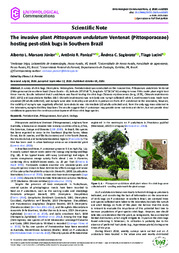The invasive plant Pittosporum undulatum Ventenat (Pittosporaceae) hosting pest-stink bugs in Southern Brazil.
The invasive plant Pittosporum undulatum Ventenat (Pittosporaceae) hosting pest-stink bugs in Southern Brazil.
Author(s): MARSARO JUNIOR, A. L.; PANIZZI, A. R.; SAGIORATO, A. C.; LUCINI, T.
Summary: A survey of stink bugs (Hemiptera: Heteroptera: Pentatomidae) was conducted on the invasive tree, Pittosporum undulatum Ventenat (Pittosporaceae) in southern Brazil (Passo Fundo - RS, latitude 28°15'46" S; longitude 52°24´24" W) aiming to know if this exotic plant might host these insects. Results indicated that P. undulatum was found hosting the stink bugs Chinavia erythrocnemis (Berg, 1878), Chinavia impicticornis (Stål, 1872) and Loxa deducta Walker, 1867. Chinavia impicticornis was rare (only one nymph collected) while C. erythrocnemis was much more abundant (30 adults collected), and nymphs were able to develop and adult to reproduce on fruits of P. undulatum in the laboratory; however, the viability of nymphs was negatively affected. Loxa deducta was intermediate (20 adults collected) and, from the only egg mass obtained in the laboratory, nymphs died few days later. The results suggest that P. undulatum may provide some nutrients and shelter, but not provide ideal conditions to guarantee the continuous development of these stink bugs species. Keywords: Pentatomidae, Pittosporaceae, host plant, biology.
Publication year: 2020
Types of publication: Journal article
Unit: Embrapa Wheat
Keywords: Biology, Host plants, Pentatomidae, Percevejo, Pittosporaceae, Plantas hospedeiras, Praga
Observation
Some of Embrapa's publications are published as ePub files. To read them, use or download one of the following free software options to your computer or mobile device. Android: Google Play Books; IOS: iBooks; Windows and Linux: Calibre.
Access other publications
Access the Agricultural Research Database (BDPA) to consult Embrapa's full library collection and records.
Visit Embrapa Bookstore to purchase books and other publications sold by Embrapa.

